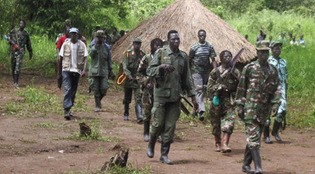 loading
loading
FindingsHow child soldiers fare in peace AFP/Getty ImagesMembers of the Ugandan Lord's Resistance Army in 2006. View full imageFor nearly two decades, a guerrilla war has simmered in northern Uganda. The rebel Lord's Resistance Army, unpopular and undermanned, filled out its ranks by forcibly recruiting young males. Between 1995 and 2004, at least 60,000 Ugandan youth were abducted by the LRA. About 80 percent of them eventually returned home, and most of these former child soldiers suffered both economically and socially. But recent Yale research has also uncovered one surprisingly positive psychological consequence. In a forthcoming study in the Review of Economics and Statistics, political scientist Christopher Blattman and psychologist Jeannie Annan report that witnessing war violence may have led the abducted youths to become more politically engaged. The findings are part of the first phase of the Survey of War-Affected Youth, a continuing study of the social, economic, psychological, and other effects of war violence in Uganda. Blattman and Annan studied 741 northern Ugandan males between the ages of 14 and 30; 462 of them were former abductees of the LRA. The researchers discovered that boys who had been abducted were more politically involved, in a positive way, after returning home. "The formerly abducted youth were a quarter to a third more likely to vote than their non-abducted peers," Blattman says. "Even more surprisingly, they were more than twice as likely to be community leaders." When the researchers further teased apart the data, they determined that the biggest predictor of increased political participation among the abducted youth was violence. Each act of violence an abductee witnessed increased his probability of voting by 4.2 percent and his likelihood of being a community leader by 2.3 percent. The most likely explanation, Blattman says, harks back to an "almost old-fashioned theory of voting. Some people vote, and are more likely to participate as leaders, because they just inherently value it more." The lesson, he says, is that trauma can sometimes create personal growth. "We went in with a hypothesis based on the conventional wisdom, which is that children are fragile and war violence cannot help but be destructive," Blattman says. "Some people do come out damaged, but it's not everyone. Some people are actually empowered."
The comment period has expired.
|
|